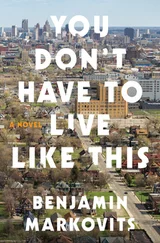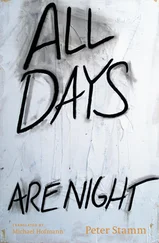“He’s been promoted to assistant director,” said the woman, visibly proud of her husband.
Andreas stayed in the kitchen while the realtor showed the couple around the apartment. He heard little exclamations of delight. Finally the three of them arrived in the kitchen.
“It’s such a bijou apartment,” said the woman.
“A bit on the small side,” said the man.
The realtor said they wouldn’t find anything bigger for that money, not in that neighborhood.
“Prices have risen steeply these past years,” he said, “and they’re continuing to climb. The apartment is a great investment.”
Andreas was surprised that they didn’t ask him why he was moving. The woman asked about playgrounds, kindergartens, and schools in the vicinity. Andreas said he didn’t have kids. There were a couple of little parks nearby, said the realtor, and the cemetery of Montmartre was just around the corner. Of course, it was nothing like Perpignan.
“Your first?” he asked.
The woman nodded eagerly, and said they’d been married just a year. She leaned against her husband, and he wrapped his arms around her neck and kissed her on the cheek. It looked as though he was strangling her.
“I love the furniture,” said the woman, “it’s very stylish. Don’t you think, Hervé?”
“We’ve been staying with my wife’s parents up until now,” the man said.
“They have an enormous house,” she said, “and a big garden with old trees.”
Andreas said he didn’t need the furniture anymore. If they wanted any of it, that was something they could talk about. Suddenly, the woman’s expression turned sad. The man put his hand on her belly, and said everything would be fine.
“It’s all so new to me,” she said, “the baby and the city, and all the things we need to get.”
“Just take a look around,” said the realtor. “I’ll leave you alone, so you can discuss it together in peace.”
The couple took another turn around the apartment. The realtor nodded at Andreas and made the thumbs-up sign. Then he rubbed the fingers of his right hand together.
“The fellow’s a bit dim,” he said quietly. “The company he works for belongs to her parents. That’s where the money’s coming from.”
Andreas offered him coffee, but the realtor declined. He put his hand on his stomach, and asked if he could have a glass of water. They waited in silence. After a while, Andreas stepped out into the corridor and looked in at the living room. The couple were standing by the window, kissing. The man had dropped to his knees, he had pushed up the woman’s skirts, and was stroking the inside of her thigh. Andreas crept back to the kitchen. The realtor looked at him questioningly, and Andreas made a face.
“It really is a lovely apartment,” said the woman, coming back into the kitchen. The man was still in the corridor, and seemed to be studying the fuse box.
“Well then, shall we?” said the realtor. He said they had another apartment to see. He shook Andreas’s hand. “You’ll hear from me.”
The hamburger was stone cold and tasted disgusting, but Andreas ate it anyway. Then he went and lay down. He lay on the sofa, and imagined the Cordeliers moving into his apartment. He stood in the yard, looking up at the lit windows behind which the family was living. The kid went up to the window, and pulled the curtain aside, and looked out. He was a little boy of about five. While Andreas watched him, he seemed to grow and get older. His mother came up behind him, pushed him away from the window, and drew the curtain shut. Her face looked worn and tired. Then Monsieur Cordelier — Hervé—came down into the yard. He was carrying two bags full of empty bottles. He dropped the bottles in one of the green recycling containers. He said something to himself, and laughed out loud. His laugh sounded rather unpleasant. Then the boy was playing ball in the yard. Someone opened a window and told him to clear out. The boy walked through the yard. He tried not to step on the cracks between the paving slabs. He skipped from stone to stone. His mother called down to him to run and play with the others. The yard opened out, and a wide landscape appeared. Andreas was on his bicycle. The road was as straight as a die. He was heading into the wind, and seemed not to be moving at all, but when he turned around, the wind was still in his face. He got off, and pushed the bicycle across the flat plain. He felt he wasn’t moving. In the sky, dark clouds slid by, but he knew it wouldn’t rain, not yet. Then it did rain. Andreas was in his room in the attic. The rain was pelting on the skylight. It was cool in the room. Andreas lay down on the bed. He was reading a book, but the words blurred before his eyes. He was on a desert island with a couple of other children. He didn’t know how they had gotten there. They were on the beach. When it got dark, they went into the forest, which was a tropical forest. They came to a crumbling tenement house, a bombed-out ruin. The children stood in front of the house and debated what to do. Andreas seemed to know the other children. They were older than him.
The telephone woke him. He looked at his watch, it was five. He hesitated for a moment, and then picked up. It was the realtor. He said things were looking good. The Cordeliers were very interested. The woman had tried to get him to lower the price, but he hadn’t budged. Her parents were coming up from Perpignan at the weekend, to look at the apartment. Would he be there? Andreas said he didn’t know.
“I know these kind of people,” said the realtor. “If they like the place, they’ll move fast.”
Andreas emptied out the cupboard in the landing. He was surprised he had so many things he had completely forgotten about. Whole boxes full of notes, letters, records. He leafed through them, stopped to read the occasional page, and then threw everything away without hesitating. A couple of cassettes he had recorded years ago, carefully writing down the tracks, he kept for a long drive sometime.
He found a box full of letters and postcards from friends, and from his mother. Letters she had written to him during his time doing national service, in which she talked about ordinary day-to-day things, illnesses, excursions, visits. The last traces of a life that was snuffed out. Traces that weren’t traces, just words without any weight. At the bottom of the box were some letters from Fabienne. He must have collected them together some time, wrapped them in packing paper, and sealed the parcel. He broke the seal and read a couple of the letters. Their banality astonished him.
Fabienne wrote to say she had a paper to write about The Magic Mountain by Thomas Mann, and had he ever read it? She had been out to a restaurant with some friends where people ate with their bare hands, like the ancient Gauls. She had met three Americans who had wanted to take her picture. Why had she written him that? One October, she had gone to Normandy with friends and gone swimming, even though the water was cold. Another time, she had eaten oysters and gotten sick. Andreas was surprised at the many friends and girlfriends she mentioned. With one letter was a photograph showing Fabienne in the middle of a group of young people. They were wearing colored paper hats and laughing drunkenly at the camera. On the back of the photograph she had written: “Best wishes for the New Year.” Best wishes for a new year that was long gone, and that Andreas couldn’t even recall. He wrapped up Fabienne’s letters in the packing paper, and put the parcel on the table. He threw away the other letters. In another carton he found a pile of his old appointment diaries, little books that left about a line of space for each day. He had never kept a diary as such, the thought of keeping a record of his life always seemed to him absurd. It was only these calendars he had kept, where the years were summed up in very few words, the names of people he had met, vacation places, dates of exams and doctors’ appointments. In his first years in the city he had written down the titles of all the films he had seen, the restaurants he had eaten in. With time, he had gotten more and more casual and remiss. He always went to the same restaurants anyway, and the films he went to see weren’t important. His meetings with Nadia and Sylvie were so regular that he didn’t need to write down dates and times. Over the last few years, there were more and more months where the calendar had remained blank, where it contained no traces. Slipped into one of them was a list of all the women he had slept with. He read the names. In some cases he couldn’t even put a face to the name, or only after long thought. The list was a couple of years old. He added a few more names, then crumpled up the sheet and threw it away.
Читать дальше












